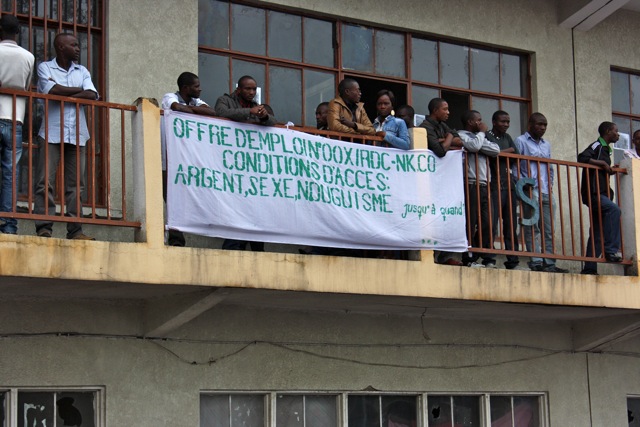
Editor’s Note: This blog was written by Desiree Lwambo and is cross-posted from her WorldPulse blog. Desiree is a researcher and consultant based in Goma. She works with the EED/Civil Peace Service, a program supporting local peace building initiatives, and serves as a gender advisor to HEAL Africa.
Recent fighting between the government and rebel groups is not the only topic occupying the minds of people living in Goma, the capital of North Kivu province in eastern Congo. Amidst the same old news about political failure, there’s a fresh buzz about a youth movement that is out to shake things up.
On the morning of May 1, Goma woke up to find its streets, squares and buildings covered in large banners. The messages in French and Swahili accused a government and a society that offers youth with little opportunity: “We are tired of unemployment—we want work now!” or “Workers’ day = day of the unemployed.”
An anonymous campaign of this size is unprecedented in Goma. It got immediate, free publicity on nearly all radio stations and, according to an inside source, even led parts of the provincial government to call in a secret emergency meeting. Within days, the co-founder of the campaign, Micheline Mwendike, was on the television, adding a face and a story to the campaign. I met with her to get that story first hand.
A Generation without Future?
Article 36 of the constitution guarantees the right to employment, yet the Congolese government has so far not created a suitable environment for economic growth. The World Bank estimates the national unemployment rate at 95 percent. With 48 percent of the population in Congo under 15 years old today, the job market is only about to get tighter.
For youth, finding a job is a particularly daunting task. Education in Congo is costly and few families have the means to send their children on the lengthy road towards a high school or university diploma. In addition, the education system is in constant demise, making recent graduates less competitive. Jobs are firstly given to those with work experience, yet even internships are hard to get by in the current situation.
In a similar vein, youth entrepreneurship and self-employment are severely stifled by insecurity, a complicated bureaucracy, arbitrary taxation and corruption.
The Way Forward: Self-Empowerment
Have the Congolese become too used to the established cycles of survival and foreign aid? Micheline believes this is the case:
It’s like everything is in balance: Our problems are discussed in conferences and debates, people reflect and re-reflect. Programs are created, along the way some funding disappears, and everything is still the way it was before.
Like most of her fellow activists, Micheline is among the few lucky ones who have a short-term contract with a humanitarian NGO. Yet she is disenchanted with her work, as she doesn’t feel that it addresses the real issues her country faces.
She said:
We have gotten so used to being pampered with all kinds of trinkets for any involvement in activism or social work. We need to create our own actions, and accept that there will be no pay for it. Then no one can use or manipulate us, it will be our own copyright.
A Movement in the Making
Indeed, the self-made concept is working. Before they even staged their first visible campaign, the movement has already raised sufficient private funding to continue their activities well into the year. Future campaigns will deal with education and infrastructure, in the hopes to mobilize more and more youth, their families, and the community as a whole.
For now, it’s all about awareness raising. “The authorities are so used to not listening, to doing nothing—if we can get them to pay attention, to start holding emergency meetings, that’s already a start.” But isn’t awareness-raising what NGOs have been doing for years?
Micheline’s response is no, “because they haven’t succeeded in reminding the Congolese people of their own dignity. Patrice Lumumba was able to do that with one short, spontaneous speech on Independence day. Likewise, we can use our youth and vitality to create our future.”
When asked what she thinks about the World Economic Forum with focus on unemployment in Africa that is going on in Addis Abeba right now, Micheline pauses for a moment. “Whatever they decide, I just want to see follow up,” she answered.
Photo: At a university in Goma, a banner reads “Job requirements: bribes, sex, nepotism. Until when?”( Chikuru Lwambo)

